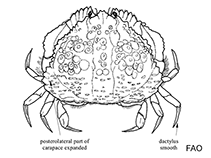Calappa rubroguttata Herklots, 1851
Spotted box crab| Native range | All suitable habitat | Point map | Year 2050 |

|
| This map was computer-generated and has not yet been reviewed. |
| Calappa rubroguttata AquaMaps Data sources: GBIF OBIS |
Google image | No image available for this species;
drawing shows typical species in Calappidae.
Classification / Names Common names | Synonyms | CoL | ITIS | WoRMS
Malacostraca | Decapoda | Calappidae
Environment: milieu / climate zone / depth range / distribution range Ecology
Benthic; depth range 0 - 90 m (Ref. 435), usually 4 - 40 m (Ref. 435). Tropical; 17°N - 19°S, 25°W - 14°E
Distribution Countries | FAO areas | Ecosystems | Occurrences | Introductions
Eastern Atlantic: Western African coast from Mauritania to Namibia.
Length at first maturity / Size / Weight / Age
Maturity: Lm ? range ? - ? cm Max length : 10.8 cm CW male/unsexed; (Ref. 435)
Life cycle and mating behavior Maturity | Reproduction | Spawning | Eggs | Fecundity | Larvae
Main reference
References | Coordinator | Collaborators
Fischer, W., G. Bianchi and W.B. Scott (eds.) 1981 True Crabs. 6: pag.var. In FAO species identification sheets for fishery purposes. Eastern Central Atlantic (fishing areas 34, 47; in part). Canada Funds-in-Trust. Ottawa, Department of Fisheries and Oceans Canada, by arrangement with the Food and AgriculturesOrganization of the United Nations, 1-7: pag.var. (Ref. 435)
IUCN Red List Status
(Ref. 130435: Version 2025-1)
CITES status (Ref. 108899)
CMS (Ref. 116361)
Threat to humans
Human uses
Fisheries: commercial
| FishSource |
Tools
More information
Diet composition
Food consumption
Predators
Max. ages / sizes
Length-weight rel.
Length-length rel.
Length-frequencies
Mass conversion
Abundance
Internet sources
BHL | BOLD Systems | CISTI | DiscoverLife | FAO(Publication : search) | Fishipedia | GenBank (genome, nucleotide) | GloBI | Gomexsi | Google Books | Google Scholar | Google | PubMed | Tree of Life | Wikipedia (Go, Search) | Zoological Record



